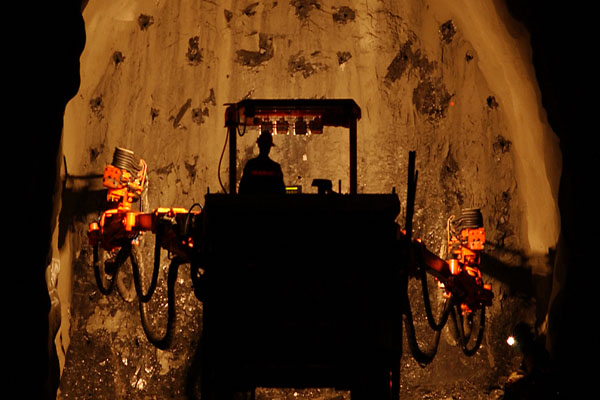Four workers were found dead and 10 rescued after the collapse of a tunnel at Freeport-McMoran’s Grasberg mine in the highlands of Indonesia’s Papua province on Tuesday.
The rescue team worked through the night on Tuesday to evacuate the 10 workers, and efforts continue to rescue around 25 workers still believed to be trapped in the debris. However the process has been hampered by limited space in the tunnel, the company said in a statement on Wednesday. The rescue team has had to rely on manual tools to clear the rubble, as the space is too small for heavy equipment
“This is a very sad day for us,” said Rozik B. Soetjipto, president director of PT Freeport Indonesia. “Our prayers and support continue to go out to the workers who were victims and to their families. We will continue to exert all out best efforts to evacuate the workers.”
The 10 workers were rushed to the company-owned hospital in Tembagapura and their conditions are stable. One worker has been evacuated to Jakarta to receive further medical treatment. Mateus Marandof, Selpianus Edowai, Yapinus Tabuni and Aan Nugraha were found dead.

Workers were mining in the underground tunnels of PT Freeport Indonesia. Photos: PT Freeport Indonesia
The tunnel, which was in an underground mine training facility used by PT Freeport Indonesia, collapsed on Tuesday at around 7:40 a.m. In a statement on Tuesday, Freeport estimated that 40 company employees and contract workers were in a classroom in the tunnel when the incident occurred. Three employees were able to escape.
The 50-square-meter classroom was located far from the mine’s production site, and has been used by the company since 2000. The volume of debris is estimated to be 192 cubic meters, filling 80 percent of the classroom.
Indonesia’s Ministry of Energy and Mineral Resources will send an inspection team to investigate the site and coordinate with Freeport management to discuss corrective actions as well as medium and long-term steps to prevent further disasters.
“We have already commissioned a team which will be composed of the deputy director for coal and mineral mining safety as well as three mining inspectors who will investigate the incident of the collapse,” the director general of minerals and coal at the ministry, Thamrin Sihite, told journalists in Jakarta on Wednesday, as was quoted in Okezone.com.

Freeport mine site. Courtesy of Google Earth.
A number of civil society groups have spoken out about the incident, urging the government and police to act quickly to investigate the tragedy. Activists also criticized government statements that the incident would not affect production at the mine, saying such statements show the government puts business interests ahead of worker safety.
“It’s as if they have closed their eyes to other problems such as human rights violations, environmental pollution, and even this landslide,” said Siti Maimunah, coordinator for the Civil Society Forum for Climate Justice.
Human rights groups have documented a number of human rights abuses by Indonesian security forces in Papua, linked to counterinsurgency efforts against a low-intensity war for independence in the region. By disregarding the safety of the mine workers, Mai said, the Indonesian government is committing another form of human rights abuse in Papua.
In this case, Mai said, the police must immediately investigate the cause of the collapse and announce the results to the public. The Ministry of Energy and Mineral Resources and the Ministry of the Environment must also investigate the safety of the area, the mining techniques used and the environmental management. “For this matter, Freeport operations must be stopped [while the investigation is carried out].”
Pius Ginting, Mining and Energy campaigner for Walhi National, echoed Mai’s comments. He said the underground mining at Freeport is not safe. If allowed to continue, it will only lead to further casualties. “The environmental destruction downstream [from the mine] is getting worse. Because of that, it should be stopped.”
The government seems to be powerless to supervise the Freeport mine in a way that protects workers and the environment, Pius said. “That reinforces the reasons that the mine must be stopped.”
This event highlights the fact that mining can be deadly, said A. Harris Balubun, a campaigner with the Mining Advocacy Network (Jatam), adding that the collapse indicates that the environmental conditions in the mine are not stable.
“The government should be firm but instead it is the opposite,” Harris said. “It turns out the safety of peoples lives is less important than the production environment.”
While Tuesday’s collapse is the largest and most deadly incident at the mine in recent years, landslides have killed Freeport workers in the past. On March 23, 2006, three workers were killed and several buildings were buried after a mountain cliff collapsed at the mine. In 2003, a large landslide at the Grasberg open-pit mine killed eight people and injured five, after a part of the mine pit’s south wall collapsed, sending around 2.3 tons of mud and rock crashing down on the miners. According to information published in the Sydney Morning Herald, Freeport was aware as early as two days before that there was a risk of a landslide. The company moved several pieces of heavy equipment from the area, however allowed workers to continue working at the pit wall.
An official from the department of mines, Suryatono, who led an investigation into the 2003 disaster, said that the workers told the head of the Freeport mining operation about the risk of a landslide. However, the head of the company made a “wrong decision.”
Related articles